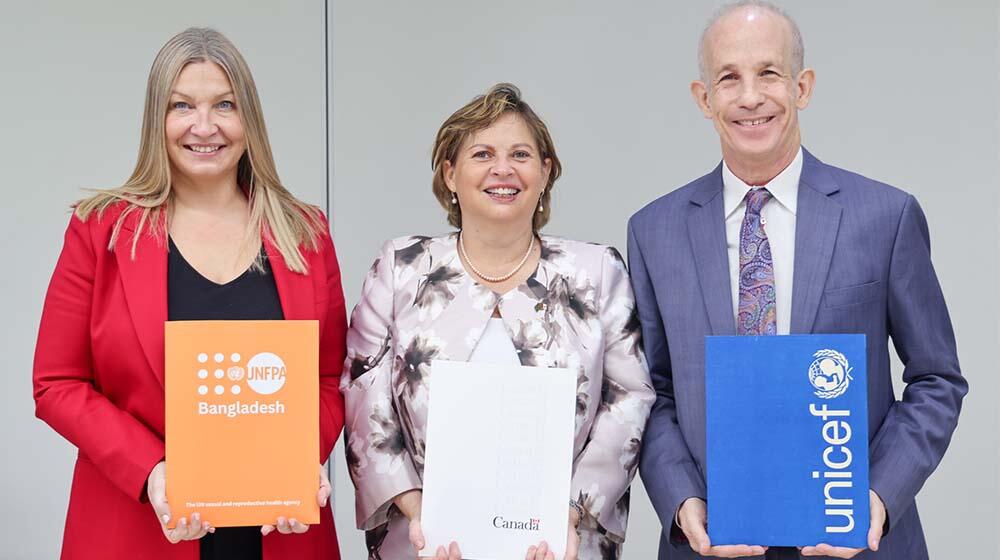Dhaka, 25 June 2024 — Canada is supporting Bangladesh to improve primary healthcare systems for women, children, and adolescents through its partnership with UNICEF and UNFPA.
The five-year project, titled “Health System Strengthening for Primary Health Care”, will address critical gaps in the healthcare system, particularly in five underserved rural areas (Kurigram, Bhola, Khagrachari, Sherpur, and Sunamganj) and will reduce maternal and child mortality while promoting gender equality and access to quality health care.
Despite progress over the past decade, maternal mortality in Bangladesh remains a significant concern. This rate has decreased from 194 deaths per 100,000 live births in 2010 to 136 in 2023, a reduction of around 30 per cent. However, this reduction is still far from the Sustainable Development Goal of 70 deaths per 100,000 live births by 2030. Many of these deaths are due to preventable conditions like hemorrhage and eclampsia.
The Canadian-funded project targets over 1.9 million women of reproductive age, two thirds of whom are adolescent girls, and nearly 6 million children including newborns and under 5 years old, ensuring they have access to essential healthcare services.
“Canada is committed to improving health care in Bangladesh, particularly for the benefit of women and girls,” said Canadian High Commissioner Dr. Lilly Nicholls. “This project aims not only to improve health outcomes in the five underperforming districts, but also strengthen health systems: better planning of budgets and human resources and improved quality of care. We hope this project can serve as a model for other districts.”
Adolescent girls remain at greater risk due to high rates of early marriage, gender-based violence, malnutrition, and a lack of sexual and reproductive health services. Alarmingly, 35 per cent of births still occur at home without skilled care, increasing the risks for both mothers and newborns.
Sheldon Yett, UNICEF Representative to Bangladesh, said, “this project will not only save children and women’s lives, but will put in place a more sustainable healthcare system, creating a safer environment where children and women, especially adolescents, can develop and thrive. Reducing maternal mortality has proven difficult, our joint work will directly address the root drivers of this critical SDG for women’s health.”
Key aspects of the project will include strengthening healthcare systems and enhancing the capacities of the Ministry of Health and Family Welfare at national, district, and local levels. It will also focus on gender-responsive and rights-based services in sexual, reproductive, maternal, newborn, child, and adolescent health. Finally, by involving local communities in health planning and delivery, the project will also create more accountable and responsive health services.
Kristine Blokhus, Representative, UNFPA Bangladesh said, “it is much safer to be a pregnant woman in Bangladesh today than just a few decades ago, but we are not yet at the finish line. With this project, we will collectively support the Government health system to go the last mile. The SDG on maternal mortality is achievable in Bangladesh, but this requires our concerted efforts to ensure that every pregnancy is wanted, and every childbirth is safe.”
One immediate outcome of the project will be enhanced quality, coverage, and gender-responsiveness of Primary Health Care and Sexual, Reproductive, Maternal, Newborn, Child, and Adolescent Health. This will ensure comprehensive care for marginalized and underserved populations, promoting women's empowerment and community participation in fulfilling the rights of women, adolescent girls, and children.
The project also focuses on addressing environmental impacts and biomedical waste reduction, aligning with UNFPA's green procurement strategy and UNICEF's commitment to sustainable development.



